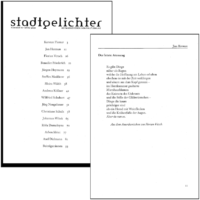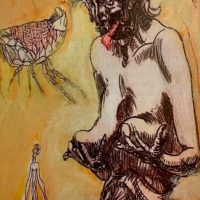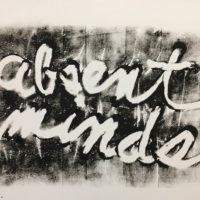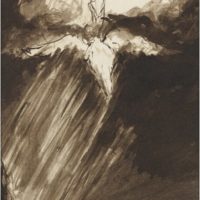‘Death is divorce in its most basic sense …
This is how it was with my parents
Who when I was 15 split apart
Bound by the need to move on
Despite the connection between them …’
David Erdos: ‘The Batchelor’s Promise’
And Now . . . for a Lively Change of Pace
Nine years ago William Osborne posted this trailer for Cybeline, a multimedia music theater work performed by Abbie Conant with music by Osborne. The staff finds it remarkable at how fresh it remains.
Stadtgelichter Nr. 15
A Serious Poetry Journal . . . Showed Up in the Mail
For more than 25 years, Stadtlichter Presse has brought out poetry books in bilingual (German-English) editions with a special interest in Beat literature and its post-Beat legacy.
‘He told ambling, long-limbed tales . . .’
SHOOTER: A Fragment is the tale of Jerry Crane, a photographer for the tabloids. Born Jiri Kiranek, he’s a truthtelling fabulist, tall and lean, a refugee from wealth and privilege. In his younger days he was often high on speed, always riffing, full of imagination. Having reached almost middle age, he still has a facile street-smart intellect. He tells ambling, long-limbed tales. It’s a peculiar form of truth-telling. When he decided to ambush Rod Bangs for a tabloid shoot, he expected the usual rock star excess: party drugs, sex, fancy toys, bad taste. But white supremacy did not make the list … until now.
The Complete Poems: 1965-2020
Michael Butterworth’s Radical Legacy in Verse
For more than half a century the dissident British author, editor, and underground publisher Michael Butterworth has been “a quiet unobtrusive voice in poetry, with roots both in the small press poetry journals of the 1960s and ’70s and New Wave science fiction.”
‘Shall we be lighthearted . . .’
‘Or shall we / bite our elbows / to the bone?’
A Great One Died 11 Years Ago Today
And there he was in a dream. We are in some restaurant, a San Francisco dream. He gives me a manuscript to read on elegant Mary Beach / Claude Pélieu stationery with raised black lettering in delicate type. He’s terminal. We both know it. He’s being objective about it. He indicates, somehow without words, not to get worked up about it. Take it as it comes. Happens to all. End of dream.
Are We Past Those Pandemic Ghosts?
A pub directly across the street from the main branch of the New York Public Library has replaced the pub that was shuttered there during the pandemic. Doorway artwork now invites the “thirsty” in for a drink, replacing the two ghostly figures seen there previously.
Éditions Béringuer
Newly Released Bellaart Drawings Connect the Centuries
A graphic narrative with a vocabulary of influences from the sixteenth century to the twenty-first.
‘Benevolent Loitering’
‘Unheard and Unseen’ in Istanbul
Having never been to Istanbul, I’ve done the next best thing — or so it feels upon reading ‘The Pleasures of Empty Lots’ by Efe Murad, poet, translator, and scholar extraordinaire. “This humble chapbook,” he writes, “is a record of the unheard and the unseen, which can only be experienced by those who find pleasure in ephemeral escapades. It is a longing for a clean slate, a tribute to benevolent loitering.” It is also more than that. It is in the most vivid, personal terms a manifesto for artistic freedom and — necessarily — social and political liberty.
Is 2023 the Year of Anti-Nihilist Gen Z?
The British magazine Prospect has just published an article making the case —making the claim is perhaps a better way to put it — that “2023 could finally hold a salve to the dark, glittery tunnel we’re living inside.” Mixed metaphor aside, good luck with that.
‘Button Up’ for 2023
Boughs wet with tears
remind the air
of sleep.
Clouds above the lake
scud on
unbuttoned, driven,
the sky beyond
my keep.
‘We bloom just once . . .’
I’m a human drape.
My bones are tight,
not so my skin. It sags
curtainlike from chin.
Pleasurable Reading: Turgenev’s Literary Reminiscences
It is filled with wisdom like this: “Life itself is nothing but a contradiction that has to be constantly overcome.”
But Where Are the Towel Racks for Kerouac and Ginsberg?
A San Francisco hotel has installed this towel rack dedicated to the memory of William S. Burroughs.
Alfred Chester, a Double Reading
Who reads Alfred Chester these days? Anyone? His huge, posthumous volume of Moroccan letters is worth every page (even the ones I felt like skipping).
A Libertarian Penchant for BS
This video sounds sane, but ‘tiz not my cuppa. As one of S/U’s indefatigable staff of thousands says, “Slickish until it’s obvious what the agenda is.”

















